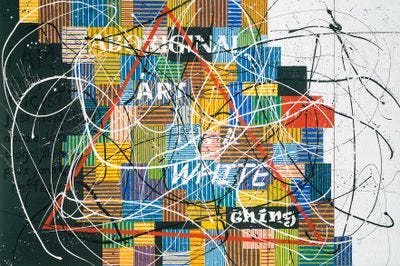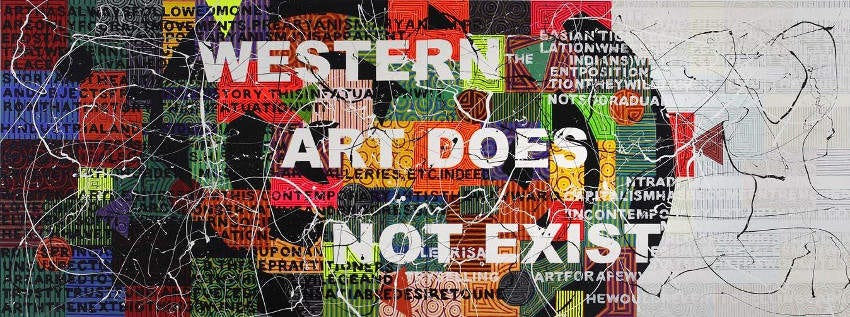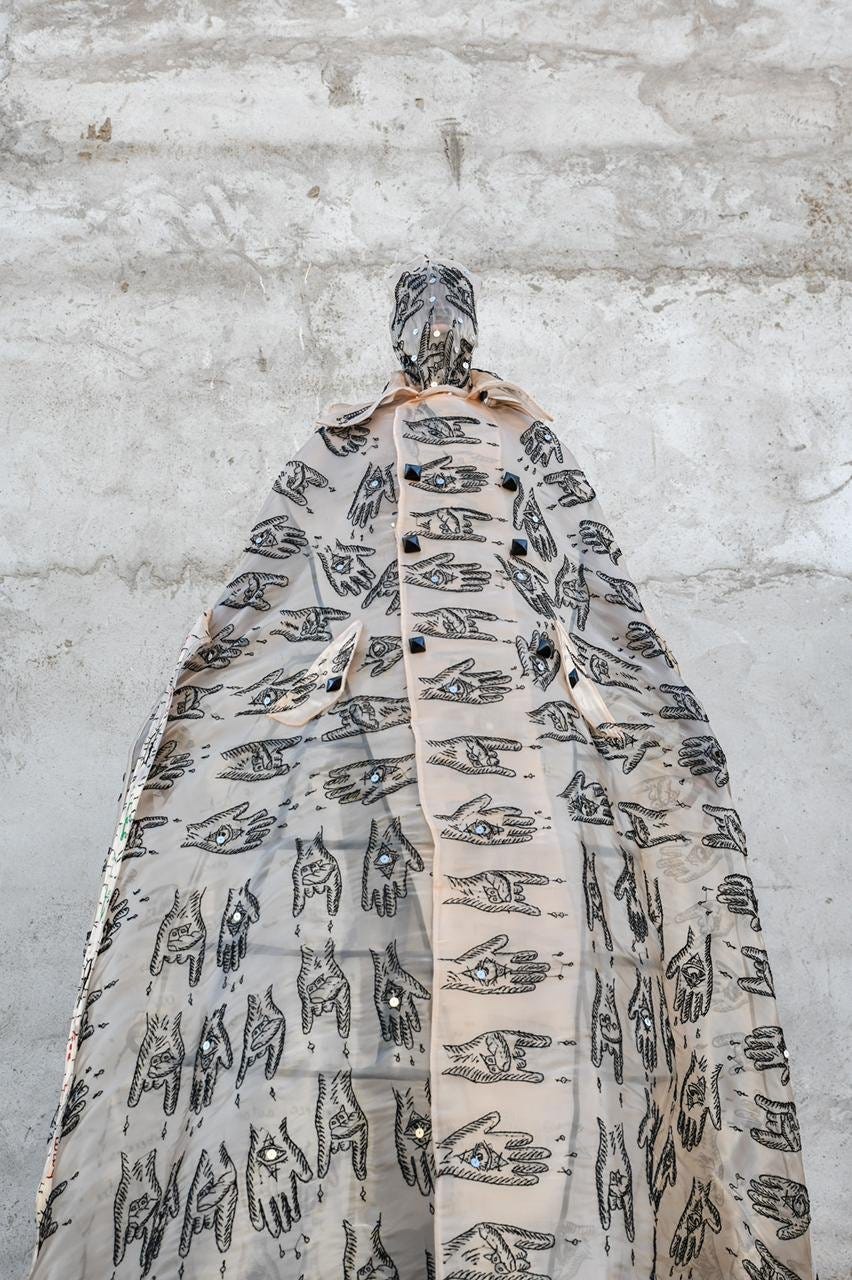TAF : Stay In School (SIS) 09 - Golden Lions, Scams, and Peripheries
Climate change, Zaria Rebels, Richard Bell, and the British Museums decline
Azul gorgeous humans-
Happy August everyone! We didn’t melt! I thought for sure this month was the hottest month in the existence of all months in all the galaxies, but it turns out July 2023 was - yay us we survived the hottest summer in 120,000 years!
The New York Times had a piece recently on what Dubai is doing to deal with weather that would constitute a deadly heat wave in Europe - highly rate it. The UAE has gotten a lot of criticism as the hosts of this year’s COP28 talks on climate change, considering the Emirates is a major oil exporter with per capita emissions among the highest in the world but in reality it’s also one of the most vulnerable places as temperatures rise. They will be one of the most affected by climate change - reeaaalll fast. Climate change is often understood as only an environmental issue, but in reality it’s a lot more complex and Western media fixation on certain things reads just a little bit xenophobic, a teeny tiny bit Islamabophic, a smidge racist-y. In reality the environmental conditions in the Middle East and North Africa, and especially the Gulf states, make the region among the most vulnerable -
you better let these Arabs have the mic.
Also I am getting older and coming to the realization that this gym business is a racket. You know you just have to keep on going, in perpetuity, like forever…. Ouf. It’s too much.
Okay, on that existentialist note let’s get into it.
Things I Am Living For:
Antoinette Yetunde Oni wrote one hell of a piece on Nigerian artist-designer Demas Nwanna Nwoko, who was awarded the Golden Lion for Lifetime Achievement at the 2023 Venice Architecture Biennale; read it here: From Zaria Rebel to Golden Lion. She writes that in keeping with the artist’s criticism of slumbering European institutions and the African associates sustaining them, the theme for this year’s architecture biennale of Africa as the “laboratory of the future” rings hollow given the concentric rings of exclusivity and inaccessibility (beginning at the Italian Visa Facilitation Office) of the international showcase. However, the biennale’s recognition of the Nigerian “artist-designer,” an honor typically reserved for better-known architects and architectural theorists, brings Nwoko’s ideas and design approach to the fore, as well as those of the Zaria Art Society movement he was a part of as a student
** ART HISTORY 2.0**: Nwoko was involved with the student-led Zaria Art Society, which was born out of the Nigerian College of Art, Science, and Technology at Ahmadu Bello University, which informed his design approach and material understanding. Colloquially known as the Zaria Rebels, the art and design movement challenged Western conventions and embraced local, artisanal, and post-colonial counter-imaginaries not taught in the university curriculum at the time. Notable Zaria Rebels such as Uche Okeke, Bruce Onobrekpeya, and Yusuf Grillo made great strides in illustration, painting, and sculpture. Originally a sculptor himself of teak and terracotta figurines, Nwoko went on to interpret this afro-modernist thought through an architectural medium.
The fact that the Biennale gives Nwoko an additional layer of visibility circles back to ideas of validation and spheres of power and how work can remain marginal unless set routes to validation are undertaken but that is another story for a different day. Nwoko’s work, which spans from painting, carving, and sculpture, to theater set designs and architecture, is characterized by experimental tropical builds and a veneration of traditional West African craft, and stands as a prime twentieth-century example of decolonial and decarbonized African architecture.
Nwoko’s contribution to the (re)formation of African cultural identity through architecture deeply resonates with designers working today in contexts still reeling from the effects of colonialism and neocolonialism. In a recent interview, Nwoko claimed that “it would be too much to think that the people who brought us to this impoverished state are the ones who are going to volunteer to repair it” (serving Lorde energy.) Oni ends the piece with reminding us that the opportunities open to African and Afro-diasporic practitioners that lie just beyond the professional pathways prescribed by tired Western institutions.
Speaking of institutions that aint shit:
Richard Bell : “Aboriginal Art it’s a White Thing!”
As you know I like a little provocation with my art.
Richard Bell, Aboriginal Australian artist, member of the Kamilaroi, Kooma, Jiman and Gurang Gurang communities, and political activist, is eloquent AF when it comes to perceptions of Aboriginal art within a postcolonial history and framework, taking something so complex and challenging and adding a bit of humor. We like to laugh.
Uncle Richard used Terry Smith's concept of 'The Provincialism Problem' (1974), to expose Australia's cultural cringe, and the replacement of a national art by an othering of Aboriginal art, where spiritual iconography is misappropriated, and rural communities of Aboriginal artists exploited.

He also thinks the government’s involvement in the Aboriginal art centres is just a way for the government to have control of and oversee the industry. He also thinks it’s their way of justifying the use of Aboriginal art appropriation and imagery in advertising etc. It is their way of ‘buying the culture” considering how little involvement Aboriginals actually have in the Aboriginal art industry. The main players in the field of Aboriginal art are the white people who are experts in Anthropology or Western Art. He also employs the powerful example of Picasso's appropriation, Uncle writes, 'Westerners drooled at Picasso's originality—to copy the African artists while simultaneously ignoring the genius of the Africans'. (I’ve been saying for years Picasso ain’t shit, Baya Mahieddine for the win).
The fact is that “Western art” has evolved into a complex system of galleries and museums, art school and education, and curators, critics, and dealers. Uncle Richard says something interesting and touches on the issue that it is unwise to market Aboriginal art from a Western aesthetic and attach an Aboriginal spirituality. Call it what it actually is he says - Abstract Expressionism. This idea of commercialized spirituality and how it gets warped into authenticity is something I’m going to let percolate for a while and come back to because there is a lot to unpack there. Stay tuned.
Also in other institutions that ain’t shit:
The British Museum Facing a Reckoning
Felaweeennn, I am dead, every morning I read the news and cackle with each new little delicious layer because y’aaallllll:
China has now joined the chat.
China joins a growing number of nations demanding the British Museum restitute artifacts from its collection in the wake of widespread thefts. As you already must know, an employee appears to have been stealing nearly 2,000 objects from the museum’s collection—including gold jewelry and semi-precious stones—and selling them on eBay. I love a resourceful girl; a man who knows how to get things done.
One Roman object, dating back more than two millennia and valued at up to £50,000 ($62,963), was allegedly sold for £40 on the site. Bargain hunters, where were you?
And since many of the targeted artifacts were uncatalogued, the full extent of the theft may never be known. The museum has fired Peter John Higgs, its senior curator for Greek and Roman art, who is believed to be responsible for the thefts. Hartwig Fischer, the institution’s director, has since resigned his post, ahead of schedule, in response to the scandal.
These the same people that said the rest of us were too savage to take care of our stuffs so you know they’ll hold on to it for us, for safe keeping - its leadership has defended its collection against restitution claims by arguing that the museum is capable of conserving and protecting artifacts uniquely well .
Girl, shut up. So embarrassing.
They said African art was safer in European museums than it would be shipped “back to the jungle.” Chika Okeke-Agulu, an art historian and restitution advocate, has compared this rhetoric to a thief demanding the construction of a secure facility before agreeing to return a stolen BMW. Vroom, vroom babes.
No, I need to stop because this is actually serious.
This really just highlights the absurdity of all this cloak-and-dagger maneuvering - institutions like the British Museum’s long time longstanding claim to be the safest possible repository for world culture is falling apart in slow motion and I am here for it - sipping on atay and crunching on my silly little pine nuts.
For all the wastemen who ask: “wHaT dOeS rAcE hAvE tO dO wItH aNyThInG?¿? wHy Do YoU gUyS aLwAyS pUlL tHe RaCe CaRd?¿?”
I still tell you, everything.
Time to send that BMW to the jungle. Like I said, vroom, vroom babes.
He may not come when you call him, but He’s always on time.
In cool stuff I came across while PhD hunting- I’ve finally realized that at the core of my research revolves around unpacking the idea of unbalanced power relations between (post)colonial centers and peripheries - only took me two years but finally got to the heart of it all in a concise and cute manner instead of my usual ramble around politics and institutions and racism and stupids: this quote helped“…research in the fields of postcolonial studies have shown that concepts such as progress and civilization are based on Eurocentric, teleological, (social-)Darwinist perceptions (Bowden 2004; Kohn & Reddy 2006). Yet, this is still a prominent factor in Western debates regarding Southern world regions and their inhabitants, without reflecting on the concepts themselves. The idea of progress is often associated with technical achievements, monumental architecture, etc. without questioning the negative aspects inherent in these developments – for example with regard to the climate crisis – or to what extent they actually improve the quality of life for broad sections of the population. European perception of progress thus continues a devaluation of other forms of societal organization and ways of life.” Source
I leave you with:
Eating them up in outfit. الله يحفظك و يهديك
& if you’re looking for a chill vibe, straight goblin mode, to go with your saffron tea, and your cozy pants listen to this album with my one&only Bomo Piri 😍 😍 on vocals; this multi-hyphened talent did it again- I would link his socials but he’s not that kind of fish. Baby has zero public profiles and I’m living for it because I’m that kind of fish too. #teamyoubettercallmetoki
Here- listen:
All my love. See you next month.
Wided








